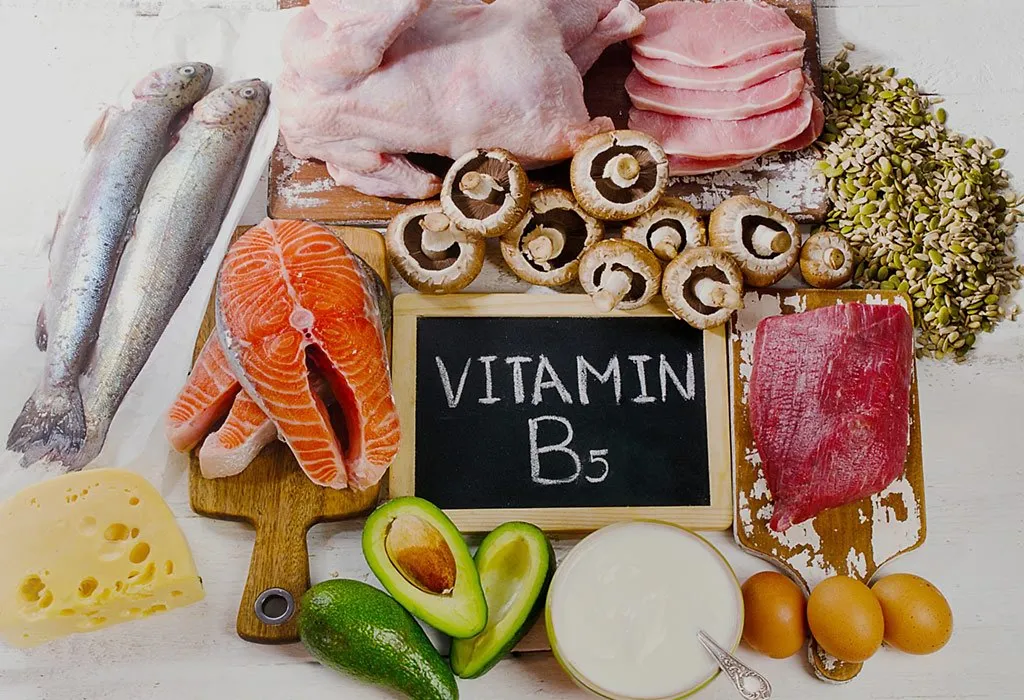Taking Vitamin B5 (Pantothenic Acid) During Pregnancy
Vitamin B5 or pantothenic acid plays a vital role in helping a person lead a healthy life. It helps the body convert the food consumed into energy. It has been named ‘pantothenic’ because it is naturally found in many food sources, which means it is absorbed from everywhere. It turns carbohydrate into glucose that produces energy. This vitamin, like other vitamins and essential nutrients, is important for the health of a pregnant woman. In this article, learn more about this vitamin, its importance in pregnancy, food sources, and more.
What is Pantothenic Acid?
A water-soluble vitamin, pantothenic acid or vitamin B5, is an essential nutrient present in many varieties of foods. The term has been derived from the Greek word ‘panto’ meaning ‘everywhere’. It is used as a dietary supplement and consumed in recommended daily allowances. It helps food to convert into energy and is necessary for making blood cells. It helps in the proper functioning of the nervous system.
Recommended Daily Intake for Pregnant Women
As it is common for most nutrients, the recommended intake varies according to age. The adequate intake for adult and women including pregnant women has been set at 5mg per day. Adequate intake for lactating women has been set at 7mg per day.
Importance of Vitamin B5 in Pregnancy
A series of B vitamins, known as vitamin B complex like Vitamin B6, B9, B12 are important aspects of nutrition during pregnancy. They help in rebuilding organs, tissues, and muscles. Quality prenatal vitamins assure you of the following benefits:
- help in releasing stress-relieving hormones.
- aid in preventing muscle cramps, common during pregnancy.
- help in metabolizing proteins, fats, and carbohydrates.
- enhances the healing procedure for skin wounds.
Pantothenic Acid Deficiency
As pantothenic acid is found in almost all foods, it is extremely rare to hear about its deficiency. It can, however, happen in combination with other B vitamins deficiency. Some symptoms of the deficiency include depression, fatigue, stomach pain, insomnia, burning feet, vomiting, etc. The deficiency of the supplement is known to cause increased sensitivity to insulin.
If Vitamin B5 is taken in very high doses, it can cause diarrhoea and can also potentially increase the risk of bleeding.
Food Sources of Vitamin B5
Vitamin B5 relieves leg cramps and produces important hormones. It is invariably found in plant and animal products. It is found in meat, fish, grains, dairy products, legumes, and vegetables. Keep in mind that the quality content of the product is lost during milling, canning, freezing or boiling. Its naturally high food sources are given below:
- Whole grains
- Egg yolk
- Brown rice
- Cashew nuts
- Broccoli/cauliflower
- Sweet potato
- Mushrooms
- Chicken breast
- Milk
- Oranges
- Bananas
FAQs
Many people have queries regarding the intake of the supplement. The most frequently asked questions are:
1. Can you take vitamin B5 supplements while pregnant?
Pantothenic acid is essential for producing cholesterol and hormones and the metabolism of fats, protein, and carbohydrates. About 6mg of the vitamin can be consumed daily. It plays a major role in the process of the baby’s growth and development. It regulates the body’s adrenal activity, produces antibodies and improves wound healing. Hence pantothenic acid and pregnancy can go hand in hand.
2. What happens while taking excessive vitamin B5 when pregnant?
There could be possible dangers of taking an excess amount of pantothenic acid than the recommended adequate intake. Anything more than 10mg is termed as high dose and may lead to diarrhoea. It is speculated that high doses can cause heartburn or nausea or dehydration. Consistent overdose of this Vitamin may lead to oedema characterized by swelling with sensitivity and itchiness.
Vitamin B5 helps the body convert food into energy and makes blood cells. If you regularly eat a healthy and balanced diet incorporating a wide variety of foods you will neither suffer from deficiency nor require supplements.
Also Read: Taking Vitamin E during Pregnancy
Was This Article Helpful?
Parenting is a huge responsibility, for you as a caregiver, but also for us as a parenting content platform. We understand that and take our responsibility of creating credible content seriously. FirstCry Parenting articles are written and published only after extensive research using factually sound references to deliver quality content that is accurate, validated by experts, and completely reliable. To understand how we go about creating content that is credible, read our editorial policy here.



































